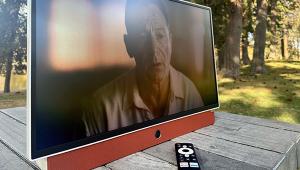EchoStar in Merger Talks with GM
The Littleton, CO–based DBS company has received some positive response from General Motors to its offer to acquire Hughes. "We expect to have a dialogue," said GM spokeswoman Toni Simonetti, "The board of directors [of GM] is very interested in leaving no stone unturned when it comes to the disposition of Hughes," she stated. "We are doing an investigation of every part of the deal," said GM's CFO John Devine.
"I am encouraged that GM is taking our proposal very seriously," responded Charlie Ergen, chairman and CEO of EchoStar. "I continue to believe that the GM board will recognize, as we do, the extraordinary compelling benefits that an EchoStar-Hughes combination would offer shareholders. Our proposal represents a significant premium for GMH shareholders and will bring unparalleled synergies of up to an additional $56 billion to all shareholders of GM, GMH, and EchoStar.''
Ergen believes that a merger of the two DBS services will offer both rural and urban customers the benefit of "reduced prices, the availability of new services such as HDTV and high-speed Internet access, and our ability to more than double the number of cities to which we provide local channels."
DirecTV, North America's biggest DBS service, has over 10 million subscribers. EchoStar has approximately six million subscribers of its own. The combined service would create a virtual monopoly in the sky, controlling more than 90% of the market, according to executives at rival bidder News Corporation. Albert Foer, president of the Washington, DC–based American Antitrust Institute, told the Wall Street Journal that an EchoStar/DirecTV merger would place "between 3.4% and 19% of the population under monopoly conditions"—ie, those viewers in rural areas, for whom DBS is the only choice. "There is probably an enormous dynamic efficiency in keeping the satellite companies pitted against each other," Foer speculated.
Other experts, such as former Clinton administration antitrust official Donald Russell, believe that an EchoStar/DirecTV merger would help consumers by increasing competition between a single DBS service and entrenched cable-television systems. According to the Consumer Electronics Association, there are more than 98 million television-equipped homes in the US, approximately two-thirds of which get their TV signals via cable. Federal antitrust regulators appear to be siding with News Corp., which has been in discussions with GM for months about acquiring Hughes.
Ergen put a different spin on the estimated number of consumers who would be affected, saying that the merged companies would account for only "18% of the multi-channel TV market." He added that EchoStar's "willingness to discuss nationwide pricing to address markets where there is no competition from cable gives us confidence that we will receive the necessary government approvals."
The deal is valued at about $30.4 billion, according to the latest available figures. "We prefer to keep the substance of those conversations private," EchoStar's Ergen said of recent discussions with both companies' shareholders.
- Log in or register to post comments





















































